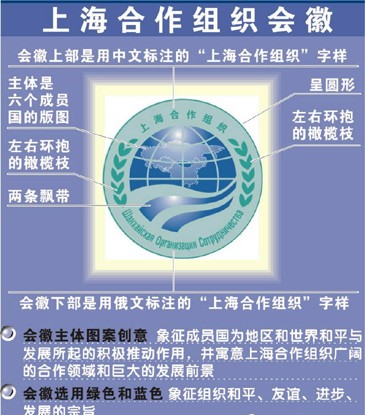SCO vows to further regional cooperation

SCO emblem
On July 19 to 21, the 11th International Conference on Central Asia and SCO was held in Shanghai. Experts and scholars from the Shanghai Cooperation Organization (SCO)’s member states, the People’s Republic of China, the Russian Federation, the Republic of Kazakhstan and the Republic of Uzbekistan, and additional participants from the U.S., Britain and Sweden attended the conference and discussed the development path of the SCO during the next decade. The conference was co-sponsored by the Institute of International Relations at Shanghai Academy of Social Sciences (SASS), the Shanghai International Culture Association, the Center of Shanghai Cooperation Organization Studies at SASS and the China Foundation for International Studies.
Pan Guang, director of the Center of Shanghai Cooperation Organization Studies at SASS, said: “Since its (the SCO’s) inception in 2001, the ‘Shanghai Spirit’—mutual trust, mutual benefit, equal rights, consultations, respect for the diversity of cultures, and aspiration towards common development—has become the soul of SCO.”Pan elaborated that each member state of SCO has moreover gradually molded its rules of conduct and cooperative principles to conform with the “Shanghai Spirit”. Under the guidance of the “Shanghai Spirit”, the SCO has completed its initial rules and systems, organizational structure, and summit forums.
The SCO’s development and trajectory for the next decade was a central topic of discussion at the conference. In addition to reaffirming the value of the “Shanghai Spirit” as a guiding framework, attendees agreed to stick to the principles of non-alignment and openness in perfecting new power relations, and to build a friendly, cooperative relationship with the United Nations and other international and regional organizations. Attendees envision the SCO becoming an irreplaceable force for regional cooperation in Central Asia.
Historically, big powers have always regarded Central Asia as a strategic region. Located in Central Asia, the SCO member states can expect significant influence from a variety of political and economic factors affecting the region’s future development.
Feng Yujun, director of the Institute of Russian Studies at China Institutes of Contemporary International Relations, said that the U.S. has shifted its strategic center to the Asian-Pacific region, leading the initiative to construct the Trans-Pacific Partnership and Trans-Atlantic Trade and Investment Partnership Agreement, and to promote what is has called the “New Silk Road” vision of increased trade connections in Central Asia. Feng elaborated that Russia has mainly pushed for Eurasian economic integration and extended the tenancy period of military bases in former Soviet Union satellite states, an effort he analyzes as a pursuit of to rebuild friendly relations with these countries. Meanwhile, the advent of America’s “shale gas revolution” will have adverse effects on China, Russia and other energy-rich member states of SCO, Feng commented.
The SCO has recognized mutually beneficial economic development as its stated precondition. Wang Jian, vice-director of the Center for Shanghai International Studies, believes that the SCO will further strengthen its cooperation on security and expand the range of its economic cooperation, a step he indicates will help to optimize allocation of resources within the region and to promote regional development. This is the key for SCO to work toward sustainable development and build cohesion among member states, Wang Jian emphasized. As an example, he observed that China’s demand for energy provides a tremendous opportunity for bilateral and multilateral cooperation in areas such as resource extraction and pipeline transportation. Member states should also form a common market in the field of infrastructure, electronic equipment, railway transportation and agricultural technology, collectively generating many more job opportunities and improving the economic dynamism of the region, Wang suggested. He also advised that China and Russia should strengthen cooperation in order to provide public goods for Central Asia.
Economic growth is inseparable from financial support, said Liu Junmei, associate dean of the School of Economics at Fudan University. Liu advised that on its present basis, the SCO should set up a dedicated account, a sovereign investment fund and currency exchange among SCO member states.
The Chinese version appeared in Chinese Social Sciences Today, No. 479, July 24, 2013
Translated by Zhang Mengying
Revised by Charles Horne
The Chinese link:
http://www.csstoday.net/xueshuzixun/guoneixinwen/82879.html
